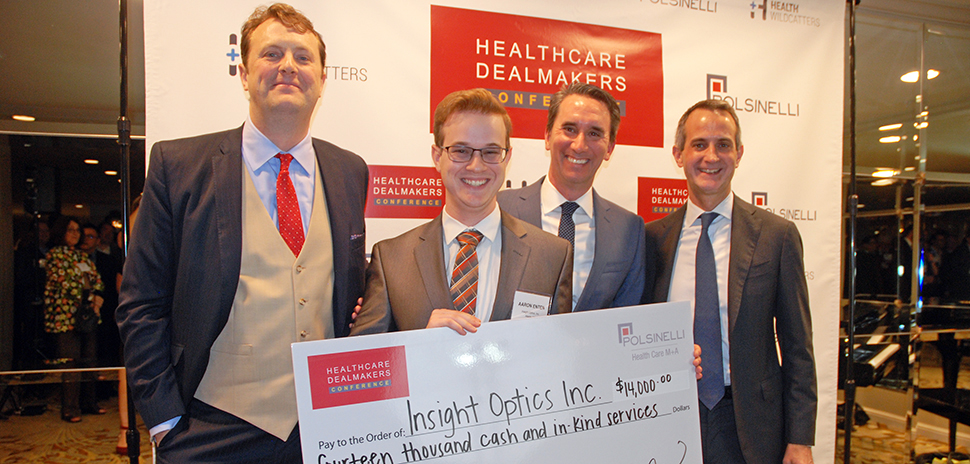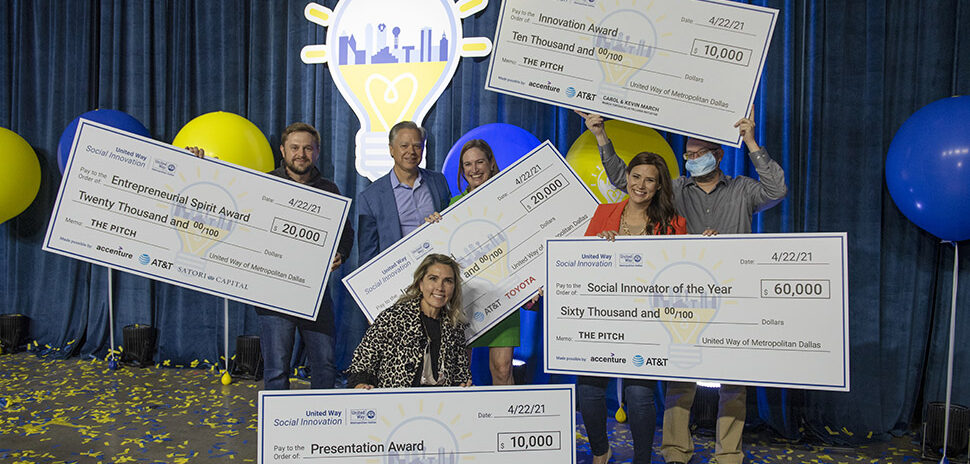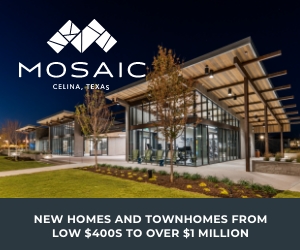Insight Optics, a health-care startup co-located in Dallas and Atlanta, took the top prize Wednesday in the Health Wildcatter’s pitch competition at the Healthcare Dealmakers Conference at the Adolphus Hotel.
Aaron Enten, the 26-year-old president, CEO, and technical co-founder of Insight Optics made the company’s pitch before a panel of nine judges and dozens of health-care and investment industry leaders who voted on the outcome. In total, 11 startups participated in the pitch as part of Healthcare Dealmakers, one of the nation’s premier events bringing together health-care providers, their capital sources, and advisers.
“This win is huge for us, between the office space and the funding, it will contribute toward our pilot and our soft launch this summer.”
Aaron Enten
“This win is huge for us, between the office space and the funding, it will contribute toward our pilot and our soft launch this summer,” Enten said. “And, it will help us to validate and get to post revenue, which is a huge hurdle for a lot of these types of startups.”
Insight Optics, a Health Wildcatters graduate, won roughly $14,000 in cash and in-kind services from Health Wildcatters and the Polsinelli law firm.
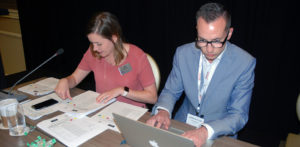
Meg Victor of Polsinelli and Loren Bolton of Health Wildcatters tabulate the scores after the pitch competition sponsored by the Dallas-based seed fund and accelerator. [Photo by Lance Murray]
The 3-year-old startup’s technology allows primary care providers to record and refer retinal videos to eye-care specialists with the intention of detecting the early signs of avoidable blindness before permanent damage is done.
Next, Enten said Insight Optics may take the stage in additional pitches.
“We’re currently in discussions with a number of people to do more pitches and to close out this bridge round,” he told Dallas Innovates.
“We’re seeking about $350,000 and that will help us get to post-revenue status,” he said. “We may or may not decide to run a seed round for about $2 million, depending on what our profit margins are at that point.”
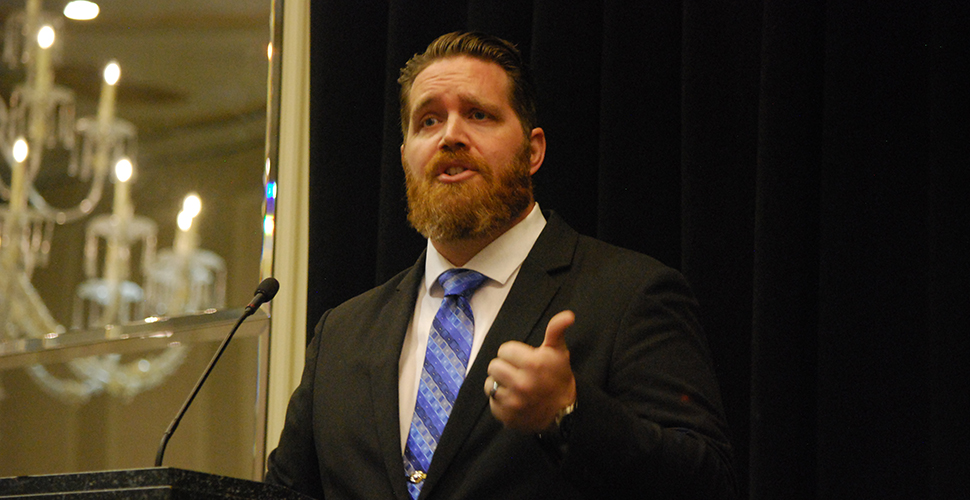
Eric Frey of Mednoxa makes his presentation during the Health Wildcatters pitch.
Second place in the pitch went to Dallas-based Mednoxa, an early stage startup developing value-based wound solutions that promote healing, reduce scarring, and prevent infection of acute and chronic wounds.
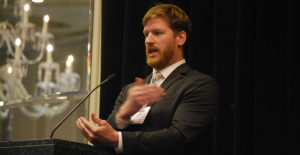
Tim Boire of VenoStent makes a point during his pitch.
Third place was VenoStent, a JLABS company formed from Vanderbilt University in Nashville, Tennessee. The startup is developing an external stent to improve the quality and length of life for roughly 2 million dialysis patients around the world.
Other startups that pitched were Advance Scanners Inc., Articulate Labs, DQPN, Kytera, Neuro Rehab VR, PrepAir Medical, VastBiome, and Verimos Wellness Blockchain.
The pitch was moderated by Health Wildcatters CEO and co-founder Hubert Zajicek, M.D.
DALLAS SHINES IN DISCUSSION OF THE HEALTHCARE INNOVATION ECOSYSTEM
Dallas was put in the spotlight during the panel discussion “Healthcare Innovation Ecosystem: A Case Study.”
“Our health-care system is not known for just one thing,” said moderator Duane Dankesreiter, senior vice president of research and innovation for the Dallas Regional Chamber. “It is our diversity that is our strength.”
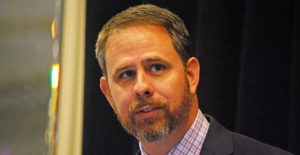
Duane Dankesreiter, senior vice president of research and innovation at the Dallas Regional Chamber, moderates a panel on the Healthcare Innovation Ecosystem.
The panel included Summer Wright Collins, divisional president of design and innovation for Blue Cross Blue Shield’s C1 Innovation Lab in Dallas, and Health Wildcatter’s Hubert Zajicek.
Dankesreiter pointed out that Dallas is the home to several major health-care companies, including Tenet Healthcare, Methodist Health System, and Steward Health Care, which is relocating from Boston to downtown Dallas. The region also is home to a cluster of medical manufacturing companies.
And, there are major research universities including UT Southwestern Medical Center, the University of Texas at Arlington, the University of Texas at Dallas, the University of North Texas, and the University of North Texas Health Science Center in Fort Worth.
“UT Southwestern is Dallas-Fort Worth’s crown jewel in health-care innovation,” Dankesreiter said, noting the number of Nobel Prize winners there and the amount of research conducted.
“We don’t want to replicate what is out there, but rather to create new solutions.”
Summer Wright Collins
Collins pointed out that the C1 Innovation Lab supports Blue Cross Blue Shield’s efforts in four other states.
She said the lab has a thoughtful approach to its work, and is home to 100-150 people.
“We don’t want to replicate what is out there, but rather to create new solutions,” she said.
Zajicek noted DFW’s size and diversity as an advantage.
“One of our assets is that we’re a big region,” he said.
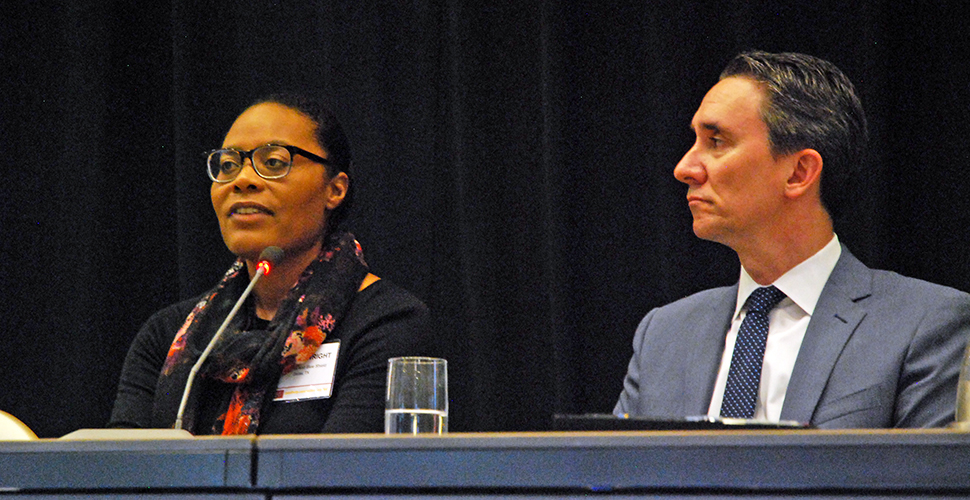
Dr. Hubert Zajicek of Health Wildcatters (right) listens to Summer Wright Collins, divisional vice president of design and innovation for Blue Cross Blue Shield’s C1 Innovation Lab in Dallas, talk about what makes Dallas an attractable city for innovative companies.
READ MORE ON PREVIOUS CONFERENCES
![]()
Get on the list.
Dallas Innovates, every day.
Sign up to keep your eye on what’s new and next in Dallas-Fort Worth, every day.

